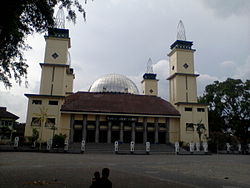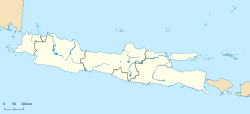|
Garut
Garut is a district and town in West Java of Indonesia, and the former capital of Garut Regency. It is located about 75 km to the southeast of the major city of Bandung. HistoryThe modern history of Garut started on 2 March 1811 when the Balubur Limbangan Regency was dissolved by Governor General Herman Willem Daendels because the area's production of coffee had decreased and the Regent, Tumenggung Wangsakusumah II, had refused a command to plant indigo. Balubur Limbangan Regency then comprised 6 districts: Balubur, Malangbong, Wanaraja, Wanakerta, Cibeureum and Papandak. The Limbangan Regency, which has now become the Garut Regency, was founded by Lieutenant-Governor Stamford Raffles on 16 February 1813. RAA. Adiwijaya, who governed from the 1813 until 1821, was the first Regent of the Garut Regency. He was well known as Dalem Cipeujueh. The town of Suci was originally the capital of the new Limbangan Regency. However it was thought that Suci did not meet the requirements of a capital because the area was crowded and quite narrow. Regarding this matter, Regent Limbangan Adipati Adiwijaya formed a committee to find a suitable place for the capital of the Regency. In the beginning, the committee found Cimurah, about 3 km to the East Suci (currently the village is known by the name of Pidayeuheun Village). However, in this place clean water was difficult to obtain so the place not regarded as suitable to become the capital. The committee then decided that a suitable place was about 5 km to west of Suci. In addition to fertile land, the place has a spring that flows to the River Cimanuk and is surrounded by mountains, like Mount Cikuray, Mount Papandayan, Mount Guntur, Mount Galunggung, Mount Talaga Bodas, Kandangwesi and Mount Karacak. When the site was first found, there was a spring nearby that was said to have been surrounded by a small pond closed off by thorny scrub. According to local stories, one person in the group had his hands badly scratched by the thorns. A European in the team asked about the bleeding and was told that the problem was "kakarut!" The answer was misheard by the European visitor as "gagarut" rather than "kakarut". Team members of the committee thus named the thorny plant "Ki Garut" and the pond was named "Ci Garut" (the location of this pond now was occupied by SLTPI, SLTPII, and SLTP IV Garut buildings). The area around the pond was named "Garut". The name of "Garut" was approved by Regent Limbangan Adipati Adiwijaya to be made the Capital of the Limbangan Regency. On 15 September 1813 the development of capital facilities and infrastructure, such as residence, the hall, office assistant resident, mosques, and square was started. In front of the hall, between the town square and the hall was gotten by "Babancong" where the Regent as well as the official of the other government gave the speech in front of the public. After the place was completed earlier, the Capital of the Limbangan Regency moved from Suci to Garut around 1821. Based on the Governor General Decree No: 60 dated May 7, 1913, the name of the Limbangan Regency was replaced to the Garut Regency and had a capital the Garut city on July 1, 1913. At that time, the Regent was RAA is Wiratanudatar (1871–1915). Garut city at that time covering the three villages, namely Kota Kulon (West City) village, the Kota Wetan (East City) Village, and Margawati Village. The Garut Regency covered Garut districts, Bayongbong, Cibatu, Tarogong, Leles, Balubur Limbangan, Cikajang, Pakenjeng, Bungbulang and Pameungpeuk. In the year 1915, RAA Wiratanudatar replaced by his nephew of Adipati Suria Karta Legawa (1915–1929). On August 14, 1925, a decision based on the Governor General, Garut Regency government passed a stand-alone (autonomous). [2] Gallery
Tourism and incidentsGarut was of importance even before World War II, being a hill station for the Dutch elite of the region.[3] The Danish writer Johannes V. Jensen accounted his visit to Garut in the short story Paa Java from 1915.[4] The legendary film star Charlie Chaplin is said to have visited Garut twice. He is reported to have visited in 1927 and 1935, staying at the Grand Hotel Ngamplang in Cilawu region, a hilly resort around 3.4 kilometers from the city center.[citation needed] More recently, Garut is a centre of tourism in the region south of Bandung for hiking, hot spas, nearby lakes and villages, and so on.[5] Nearby sites include the following:[6]

To facilitate the tourists who want to explore Garut tourism destination, there are tour operator companies who can be contacted. Local foods
Volcanoes Garut is in a valley surrounded by various volcanoes. The most well known is Mount Galunggung which experienced a major eruption in 1982. Following the eruption, over 60 people died and much damage was done to the agricultural sector and infrastructure in the region. Other nearby volcanoes are Mount Talagabodas (around 2,200 meters), Mount Guntur (around 2,250 meters), and Mount Cikurai (over 2,900 meters). BeachesAt the south of Garut there are more than 10 beaches. The most well known beaches are Santolo Beach at Cikelet district and Sayang Heulang Beach, the others are Cilauteureun, Rancabuaya, Taman Manalusu, Cijayana, Karang Paranje, Sancang, Gunung Geder, Pantai Cijeruk Indah, Karang Tepas or Sodong parat. They are located 94 kilometers from Garut and spread along 72 kilometers of south coast. Franz Wilhelm Junghuhn in the colonial era plotted the beaches. Now, since 2006 Gunung Geder Beach is boosted by the Indonesian government to be a new tourist site. Gunung Geder Beach with 7 kilometers of beach has white sand near the sea and brownish sand far the sea. Alternative route besides through Garut is through Ciwidey and Rancabali.[8] Greater GarutThe urban area of Garut town (Kota) extends into three adjacent districts, with a combined area of 149.81 km2 and an official estimated population of 482,890 in mid 2022.[1]
Notes
ReferencesWikimedia Commons has media related to Garut (city). Wikivoyage has a travel guide for Garut.
|
||||||||||||||||||||||||||||||||||||||||||||||||||||||||||||||||||||||||||||||||
Portal di Ensiklopedia Dunia









